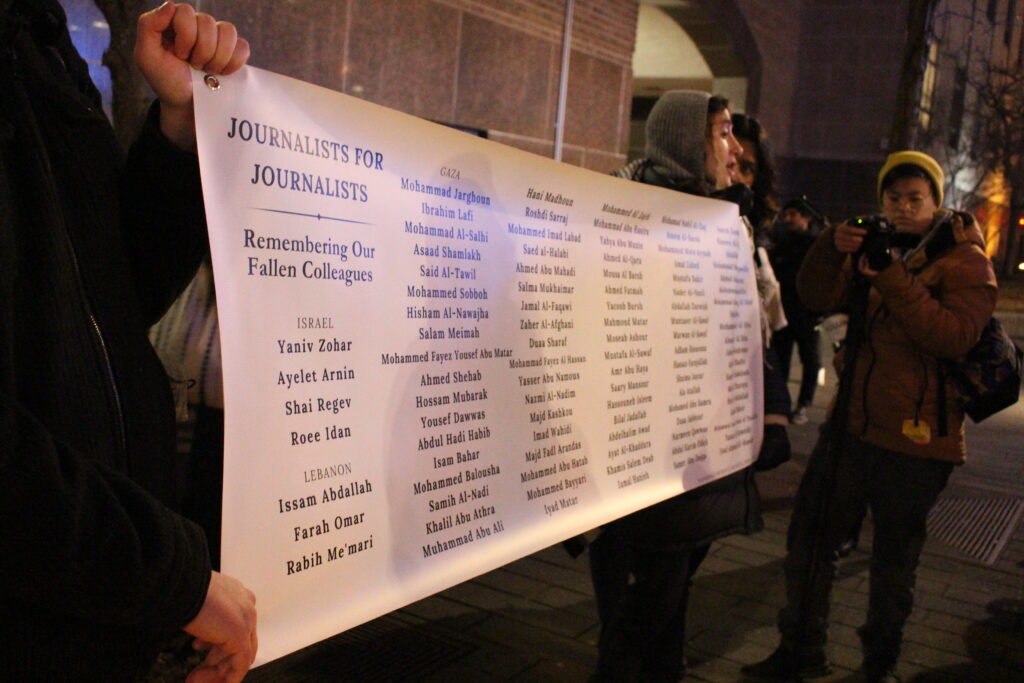
Listen to the full story:
On Thursday, a vigil to honour journalists and other media workers recently killed in Gaza, Israel, and Lebanon was held on the TMU campus at the corner of Gould and Bond Street. Journalists and journalism students from various institutions and media organisations across the GTA attended the event, titled “Journalists for Journalists,” to mourn these losses.
There have been an exceptionally large number of journalists killed in the conflict between Israel and Gaza. “In the weeks and months following Hamas’ attack, the number of journalists killed during the Israeli military campaign in Gaza skyrocketed, as we know, making it one of the deadliest conflicts for journalists in recorded history,” said Ginella Massa, a journalist and one of the event’s organisers.
Since Oct. 7, at least 85 journalists and media workers have been killed as of the vigil, according to the Committee to Protect Journalists (CPJ). This number includes 78 Palestinians, four Israelis, and three Lebanese nationals. However, some organisations put the number higher. The United Nations Office of the High Commissioner for Human Rights puts it at 122 and, according to the Palestinian Journalists’ Syndicate, ten percent of Gaza’s 1,000 journalists have been killed. In total, over 28,000 people have been killed in the war, including over 10,000 children.
Pacinthe Mattar, a journalist and co-organiser of the event, noted during her speech the CPJ found that “some of these deaths aren’t as a result of journalists being in an active war zone, and that in at least a handful of cases, journalists are believed to have been targeted by the Israeli military, along with their families, sometimes in their homes.”
“Because almost no foreign press has been allowed into Gaza unless they are embedded with the IDF and therefore subject to their approvals, it’s largely Palestinian journalists who have paid a cost no journalists should have to in covering this war,” said Mattar.
Speaker Josh Bloch of the CBC read a poem by Noor Aldeen Hajjaj, a Palestinian poet and novelist killed in an Israeli airstrike while in his home on Dec. 2, that was intended to be his final message to the world if he was killed.
“I am not a number and I do not consent to my death being passing news. Say too that I love life, happiness, freedom, children’s laughter, the sea, coffee, writing, Fairuz, everything that is joyful. Though these things will all disappear in the space of a moment,” read Bloch.
The vigil attracted a large crowd, despite the invitation being circulated privately via email to ensure it was a safe event for journalists. “We didn’t know what the response was going to be like, so to see this crowd out here tonight was very, very encouraging. And I think it also told us that this was very much needed. It was a bit of a release in a time that has been so difficult and heavy for many,” said Massa.
The vigil concluded with a reading of the names of the journalists killed and a moment of silence. “It’s really important to show that journalists, no matter whether it’s Canada or anywhere around the world, we stand in solidarity with what’s going on right now. We stand for press freedom,” said Brent Jolly, a freelance journalist and attendee.
However, some attendees felt that TMU should be doing more. “I came here because firstly, I’m a Palestinian, and secondly, I’m a journalism student,” said Laila Hashem, a student at TMU who attended the vigil. “Out of all faculties and all programs, the School of Journalism has the most responsibility right now to actually do something for their students and to actually speak up.”
Massa also believes that more can be done to support journalists caught in this conflict. “As the journalism industry, we have supported journalists killed in Ukraine; we supported journalists who were targeted by the Taliban; we’ve supported journalists who have faced attacks from many different governments in many different conflicts. So we know how to do that. We don’t need to tell these organizations how to do it. They know how to do it, they’ve done it before. So we’re just asking that that be applied here,” she said.
Patrick Pearson is a fourth-year journalism student at Toronto Metropolitan University. He is also a contributor at The Modern Insurgent.
This article may have been created with the use of AI tools such as
Patrick Pearson is a fourth-year journalism student at Toronto Metropolitan University. He is also a contributor at The Modern Insurgent.

